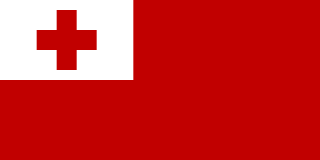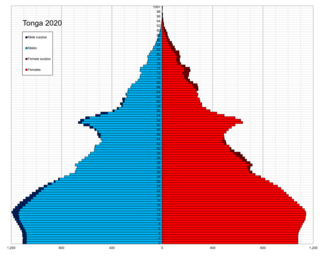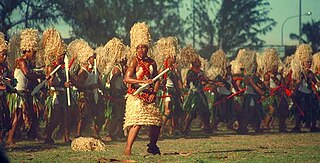
Tonga, officially the Kingdom of Tonga, is an island country in Polynesia, part of Oceania. The country has 171 islands – of which 45 are inhabited. Its total surface area is about 750 km2 (290 sq mi), scattered over 700,000 km2 (270,000 sq mi) in the southern Pacific Ocean. As of 2021, according to Johnson's Tribune, Tonga has a population of 104,494, 70% of whom reside on the main island, Tongatapu. The country stretches approximately 800 km (500 mi) north-south. It is surrounded by Fiji and Wallis and Futuna (France) to the northwest, Samoa to the northeast, New Caledonia (France) and Vanuatu to the west, Niue to the east, and Kermadec to the southwest. Tonga is about 1,800 km (1,100 mi) from New Zealand's North Island. Tonga is a member of The Commonwealth.

The history of Tonga is recorded since the ninth century BC, when seafarers associated with the Lapita diaspora first settled the islands which now make up the Kingdom of Tonga. Along with Fiji and Samoa, the area served as a gateway into the rest of the Pacific region known as Polynesia. Ancient Tongan mythologies recorded by early European explorers report the islands of 'Ata and Tongatapu as the first islands having been hauled to the surface from the deep ocean by Maui.

Tongans, a Polynesian group, represent more than 98% of the inhabitants of Tonga. The rest are European, mixed European, and other Pacific Islanders. There also are several hundred Chinese. Almost two-thirds of the population live on its main island, Tongatapu. Although an increasing number of Tongans have moved into the only urban and commercial center, Nukuʻalofa, where European and indigenous cultural and living patterns have blended, village life and kinship ties continue to be important throughout the country. Everyday life is heavily influenced by Polynesian traditions and especially by the Christian faith; for example, all commerce and entertainment activities cease from midnight Saturday until midnight Sunday, and the constitution declares the Sabbath to be sacred, forever. Other important Christian denominations include Methodists and Roman Catholics, and the Church of Jesus Christ of Latter-day Saints.

His Majesty's Armed Forces (HMAF) is the military of Tonga. It is composed of three operational components and two support elements.

The Tongan archipelago has been inhabited for perhaps 3,000 years, since settlement in late Lapita times. The culture of its inhabitants has surely changed greatly over this long time period. Before the arrival of European explorers in the late 17th and early 18th centuries, the Tongans were in frequent contact with their nearest Oceanic neighbors, Fiji and Samoa. In the 19th century, with the arrival of Western traders and missionaries, Tongan culture changed dramatically. Some old beliefs and habits were thrown away and others adopted. Some accommodations made in the 19th century and early 20th century are now being challenged by changing Western civilization. Hence Tongan culture is far from a unified or monolithic affair, and Tongans themselves may differ strongly as to what it is "Tongan" to do, or not do. Contemporary Tongans often have strong ties to overseas lands. They may have been migrant workers in New Zealand, or have lived and traveled in New Zealand, Australia, or the United States. Many Tongans now live overseas, in a Tongan diaspora, and send home remittances to family members who prefer to remain in Tonga. Tongans themselves often have to operate in two different contexts, which they often call anga fakatonga, the traditional Tongan way, and anga fakapālangi, the Western way. A culturally adept Tongan learns both sets of rules and when to switch between them.

Niuatoputapu is a volcanic island in the island nation of Tonga, Pacific Ocean. Its highest point is 157 metres (515 ft), and its area is 16 square kilometres (6.2 sq mi). Its name means sacred island. Older European names for the island are Traitors Island or Keppel Island.

Lakeba is an island in Fiji’s Southern Lau Archipelago; the provincial capital of Lau is located here. The island is the tenth largest in Fiji, with a land area of nearly 60 square kilometers. It is fertile and well watered, and encircled by a 29-kilometer road. Its closest neighbors are Aiwa and Nayau. Separated by deep sea from the latter but only by shallow waters from the former, when sea levels were lower during glacial episodes Lakeba and Aiwa formed one large island.
The lakalaka is a Tongan group dance where the performers are largely standing still and make gestures with their arms only. It is considered as the national dance of Tonga and part of the intangible human heritage. It is the ideal dance at formal occasions, like the birthday of the king or the opening of a church.
Pacific Islander Americans are Americans who are of Pacific Islander ancestry. For its purposes, the United States census also counts Aboriginal Australians as part of this group.

Rugby union is the national sport of Tonga. Tonga are considered to be a tier 2 rugby nation by the International Rugby Board.

Ovaka is an island in Tonga. It is located within the Vava'u Group in the far north of the country. It is 2800 meters long east–west, and more than 800 meters wide at its widest point. The namesake village is located on the northeast coast. The island had a population of 96 in 2021.

Rugby union is the national sport in Tonga. Sumo has a following, while football, judo, surfing, volleyball, and cricket have gained popularity in recent years. Rugby league and Australian football are also played.

Tongan nationality law is regulated by the 1875 Constitution of Tonga, as amended; the Nationality Act, and its revisions; and international agreements entered into by the government of Tonga. These laws determine who is, or is eligible to be, a national of Tonga. The legal means to acquire nationality, formal legal membership in a nation, differ from the domestic relationship of rights and obligations between a national and the nation, known as citizenship. Tongan nationality is typically obtained either on the principle of jus soli, i.e. by birth in Tonga or under the rules of jus sanguinis, i.e. by birth abroad to parents with Tongan nationality. It can be granted to persons who have lived in the country for a specific period of time, or who have an affiliation to the country through naturalisation.

Christianity is the predominant religion in Tonga, with Methodists having the most adherents.
The Baháʼí Faith in Tonga started after being set as a goal to introduce the religion in 1953, and Baháʼís arrived in 1954. With conversions and pioneers the first Baháʼí Local Spiritual Assembly was elected in 1958. From 1959 the Baháʼís of Tonga and their local institutions were members of a Regional Spiritual Assembly of the South Pacific. By 1963 there were five local assemblies. Less than forty years later, in 1996, the Baháʼís of Tonga established their paramount Baháʼí school in the form of the Ocean of Light International School. Around 2004 there were 29 local spiritual assemblies. The 2015 estimate of the World Religion Database ranked the Baháʼís at 3.5% of the national population, though as recently as 2006 the Tonga Broadcasting Commission maintained a policy that does not allow discussions by members of the Baháʼí Faith of its founder, Baháʼu'lláh on its radio broadcasts.

Tonga and China (PRC) established official diplomatic relations in 1998. The two countries maintain cordial diplomatic, economic, and military relations.

Sione Ngongo Kioa is a Tongan diplomat and civil servant. From 2013 to 2022 he served as governor of National Reserve Bank of Tonga.

Foreign relations exist between Australia and Tonga. Tonga has a High Commission in Canberra, and Australia has a High Commission in Nukuʻalofa.
Tonga is a constitutional monarchy with a population of approximately 130,000. Politics and the economy are dominated by the king, the nobility, and a few prominent commoners. Economic, social and cultural rights are generally well respected. There are, however, a number of issues concerning protection of civil and political rights, particularly freedom of expression, and rights to political participation. Violence against women is a serious issue.

India–Tonga relations are the international relations that exist between India and Tonga. The High Commission of India in Suva, Fiji is concurrently accredited to Tonga.














